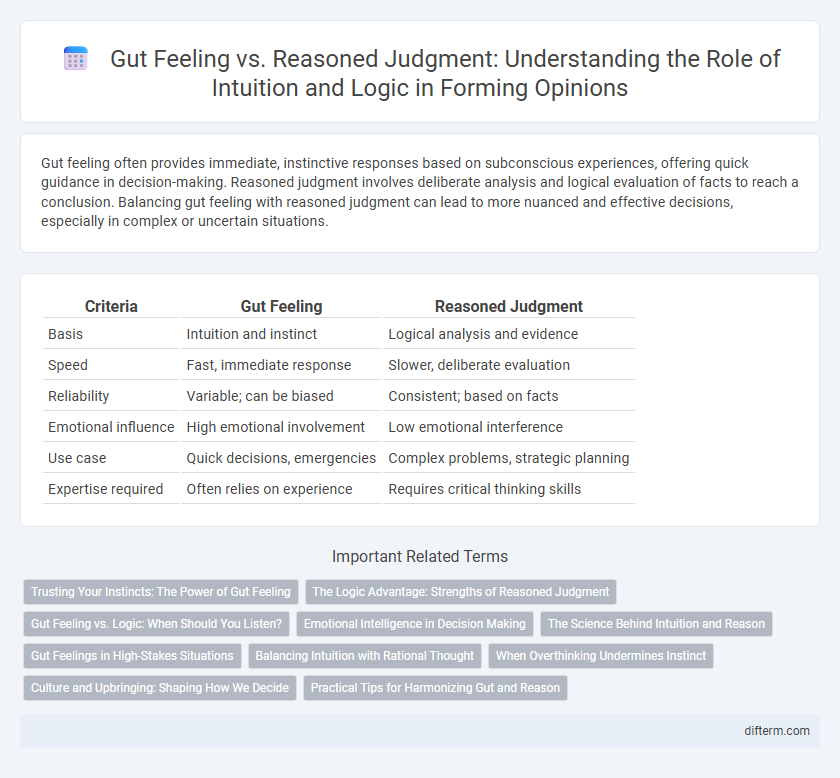Gut feeling often provides immediate, instinctive responses based on subconscious experiences, offering quick guidance in decision-making. Reasoned judgment involves deliberate analysis and logical evaluation of facts to reach a conclusion. Balancing gut feeling with reasoned judgment can lead to more nuanced and effective decisions, especially in complex or uncertain situations.
Table of Comparison
| Criteria | Gut Feeling | Reasoned Judgment |
|---|---|---|
| Basis | Intuition and instinct | Logical analysis and evidence |
| Speed | Fast, immediate response | Slower, deliberate evaluation |
| Reliability | Variable; can be biased | Consistent; based on facts |
| Emotional influence | High emotional involvement | Low emotional interference |
| Use case | Quick decisions, emergencies | Complex problems, strategic planning |
| Expertise required | Often relies on experience | Requires critical thinking skills |
Trusting Your Instincts: The Power of Gut Feeling
Trusting your instincts taps into subconscious pattern recognition shaped by past experiences, often providing quicker and surprisingly accurate decisions than purely reasoned judgment. Gut feelings harness emotional intelligence and intuition, guiding individuals through complex or ambiguous situations where data alone may be insufficient. Neuroscientific studies reveal that intuitive decisions activate brain regions linked to emotional processing, validating the power of instinct in effective decision-making.
The Logic Advantage: Strengths of Reasoned Judgment
Reasoned judgment offers a structured approach to decision-making by relying on evidence, critical analysis, and logical coherence, which reduces the risk of cognitive biases. It facilitates the evaluation of complex information, enabling more consistent and justifiable conclusions compared to impulsive gut feelings. This methodical process enhances problem-solving efficiency and supports long-term strategic thinking in diverse fields such as law, science, and business.
Gut Feeling vs. Logic: When Should You Listen?
Gut feeling often taps into subconscious pattern recognition, providing quick, instinctive responses that can be invaluable in urgent situations or when experience is rich but data is limited. Reasoned judgment relies on careful analysis and evidence, offering a structured approach ideal for complex problems requiring thorough evaluation. Balancing gut feeling with logic ensures decisions are both intuitively sound and rationally justified, optimizing outcomes across varied contexts.
Emotional Intelligence in Decision Making
Emotional intelligence plays a crucial role in balancing gut feelings with reasoned judgment in decision making, enabling individuals to recognize and manage their emotions effectively while interpreting intuitive signals. High emotional intelligence facilitates greater self-awareness and empathy, which helps in discerning when to trust a gut feeling and when to rely on analytical reasoning. Integrating emotional insight with logical evaluation enhances the quality of decisions by addressing both subconscious cues and objective data.
The Science Behind Intuition and Reason
Neuroscientific research reveals that gut feeling originates from the brain's fast, automatic processing system, enabling rapid decisions without conscious reasoning. Reasoned judgment, engaging the prefrontal cortex, relies on deliberate analysis and logical evaluation of evidence. Understanding the interplay between intuitive and analytical processes enhances decision-making accuracy in complex situations.
Gut Feelings in High-Stakes Situations
Gut feelings often provide rapid, intuitive insights that are crucial in high-stakes situations where time constraints limit thorough analysis. Neural mechanisms, such as the brain's limbic system, facilitate these instinctive responses by processing emotional and experiential data beneath conscious awareness. In emergency or crisis scenarios, trusting gut feelings can enhance decision-making speed and accuracy, outperforming slow, reasoned judgment when immediate action is necessary.
Balancing Intuition with Rational Thought
Balancing intuition with rational thought enhances decision-making by integrating gut feelings with evidence-based analysis. Neuroscientific studies reveal that intuition draws from subconscious pattern recognition, while reasoned judgment relies on analytical processing within the prefrontal cortex. Effective decisions emerge when individuals calibrate instinctive insights with logical evaluation, optimizing outcomes in complex scenarios.
When Overthinking Undermines Instinct
When overthinking clouds instinct, decision-making becomes paralyzed, sacrificing the intuitive leaps that often lead to accurate outcomes. Excessive analysis triggers doubt and second-guessing, which undermines confidence in gut feelings rooted in subconscious pattern recognition. Trusting instinct in moments of uncertainty taps into deep cognitive processing, making reasoned judgment vulnerable to unnecessary complexity and hesitation.
Culture and Upbringing: Shaping How We Decide
Cultural norms and upbringing significantly influence whether individuals rely on gut feelings or reasoned judgment in decision-making. In collectivist societies, intuition often aligns with shared values and social harmony, promoting decisions rooted in gut feelings. Conversely, individualistic cultures emphasize analytical thinking and personal responsibility, encouraging decisions grounded in reasoned judgment.
Practical Tips for Harmonizing Gut and Reason
Balancing gut feelings with reasoned judgment enhances decision-making effectiveness by integrating intuitive insights with logical analysis. Practical tips include pausing to reflect on emotional responses, seeking evidence to validate instincts, and practicing mindfulness to increase awareness of subconscious cues. Regularly reviewing past decisions helps refine the synergy between intuition and critical thinking for better outcomes.
gut feeling vs reasoned judgment Infographic

 difterm.com
difterm.com